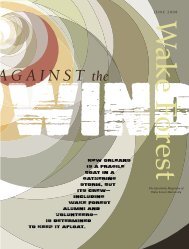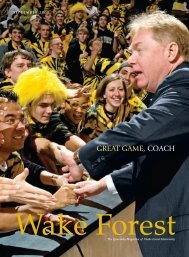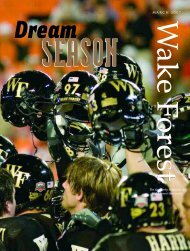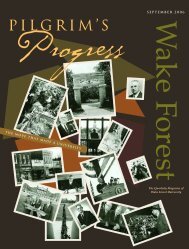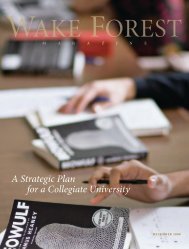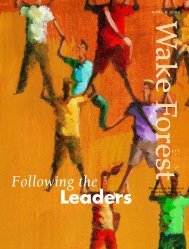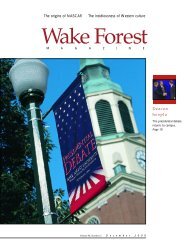Wake Forest Magazine September 2003 - Past Issues - Wake Forest ...
Wake Forest Magazine September 2003 - Past Issues - Wake Forest ...
Wake Forest Magazine September 2003 - Past Issues - Wake Forest ...
Create successful ePaper yourself
Turn your PDF publications into a flip-book with our unique Google optimized e-Paper software.
“Using technology has given me another exciting way of sharingthe material. But if you are a bad teacher, you will use thetechnology in an uninteresting way.”Gala laughs at times when she spent hours on a multimediapresentation only to have a technological glitch at class time.“You just have to say this is not working, let’s teach. If youdon’t know to manage without the computer, that would beterrible.You should be able to say let’s move on.”Technology has tremendously changed the way Gala preparesfor her classes. After twenty years of teaching, she could teachsome classes with her eyes closed. “But now I’m challengedmyself—how am I going to make this as exciting for them asit is for me? It makes you be very creative in terms of how yougo about your topic,” she said.Gala’s main concern is the potential increase in plagiarismthat she says is largely due to the absence of good citationmethods. Faculty members sometimes use anti-plagiarism softwareto identify copied work, but Gala feels uncomfortableputting herself in that position. “This is nothing new—studentsstill plagiarized in the past. But the careless use of informationhas increased because of technology,” she said. “I think it’sbecause it’s the nature of the beast. Because they can go on theInternet so easily, they think that what they read on the Internetbelongs to everybody.They don’t stop to think someone wrotethat and someone owns it as intellectual property.”Faculty members can avoid many such situations by assigningtopics that are not easily found on the Internet. “If youtalk about Cervantes and ask about madness, there are probablya hundred essays they could find,” she said. “You try toassign something that will make the students think rather thantalk about something where they can just copy someone else.”While Gala calls herself a huge fan of the Internet, sheworries that its use will lead to less reading of books. “I tellstudents the library is a wonderful place, not just a place to doyour homework. I try always to praise the wonders of thelibrary, particularly in America where the libraries are totallyopen to everyone,” she said. “In Europe, where I come from,the libraries are still very much under the 18th century mentalitywhere they are for a very exclusive group of people.Theydon’t allow you to have direct access to the book.When Icame here and I saw you could have access to any book youwant, I saw that this was heaven.”Michael Hyde, University Distinguished Professor ofCommunication Ethics, looks at the Internet in a philosophicalway. In the book he is currently writing, The Life-Giving Gift ofAcknowledgment, Hyde argues that the computer is a tool forfacilitating the acknowledgment humans need to survive.“What we’ve created with computers and the Web is the closestthing we’ve ever come to the design that God makes of theworld,” Hyde said. “There is no other technology that has everallowed more people at any given moment in time to call outfor help and in a synchronic way to get immediate feedback.”Hyde quotes Clifford Stoll, one of the creators of the Internetand now one of its critics, in his book: “Want a nation of dolts?Just center the [educational] curriculum on technology—teachwith videos, computers, and multimedia systems. Aim for thehighest possible scores on standardized tests. Push aside suchless vocationally applicable subjects as music, art, and history.Dolts are what we’ll get.”Hyde said Stoll’s comment applies only to worst-case scenarios.“Biologically speaking, acknowledgment is absolutelyessential. It is a life-giving gift. Any kind of tool that can facilitateacknowledgment is a tool that should be given somerespect.The question is, do computers do that? The answer iswithout a doubt, oh yeah.”“Any kind of tool that canfacilitate acknowledgmentis a tool that should begiven some respect.”MICHAEL HYDEBut Hyde points out instances when student use of thecomputer does seem a bit doltish. “When the system’s downthe students get so frustrated that they can’t use InstantMessenger, and my question is,‘Why don’t you just walk outside?’Theirargument is that is easier said than done becauseyou get so conditioned with the ways of IM and meeting peopleon the Net that you don’t always do that well in person.People have talked about this for a long time, but in a very hightechenvironment like <strong>Wake</strong> <strong>Forest</strong>, you really start to see it.”E-mail encourages the type of acknowledgment Hyde thinksis crucial to the educational process. He once had a studentwho was terrified of speaking in class, a major disadvantage inthe communication department. So Hyde began correspondingwith her by e-mail and encouraged her to participate. “Fromthat day on she changed and started talking.The computerallows you to find things out that quiet students will never sayand to use them for their benefit.”Shepard Wallace (’04),a student who helped Hyde edit hisbook over the summer, said he can envision the “nation ofdolts” referred to in the book. “I don’t see that happening rightnow, but in the next couple of decades it’s possible,” he said.“People could get so reliant on technology that they forgetabout the classics that are only available in print.”Wallace, a communication major from Greenville, SouthCarolina, said the key to using the Internet well is finding ahealthy balance between online and library research, betweene-mailing and talking face-to-face. “People who care will neverabandon the printed word,” he said. “They know they’reengaged in something that’s real.”<strong>September</strong> <strong>2003</strong> 25




